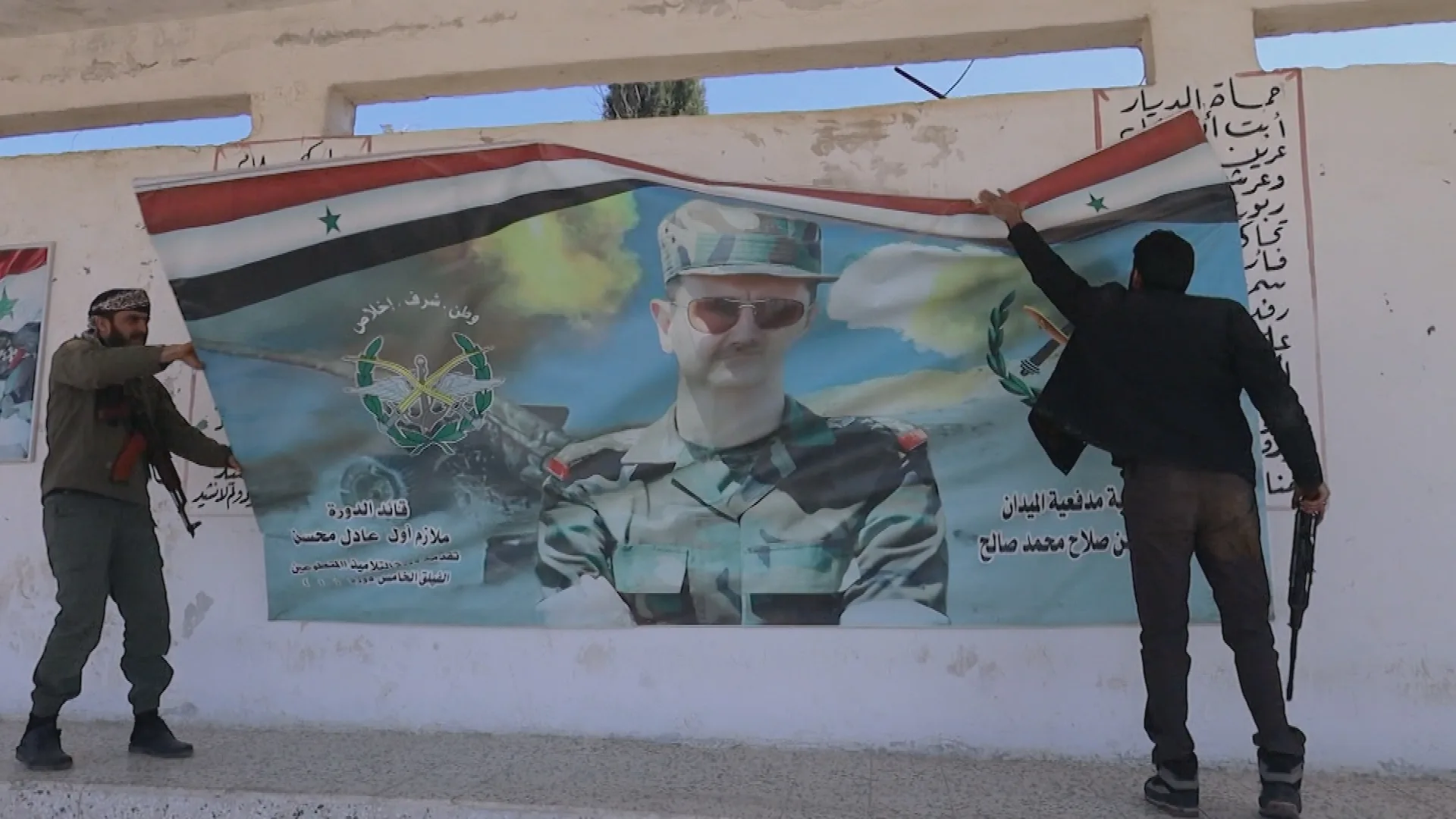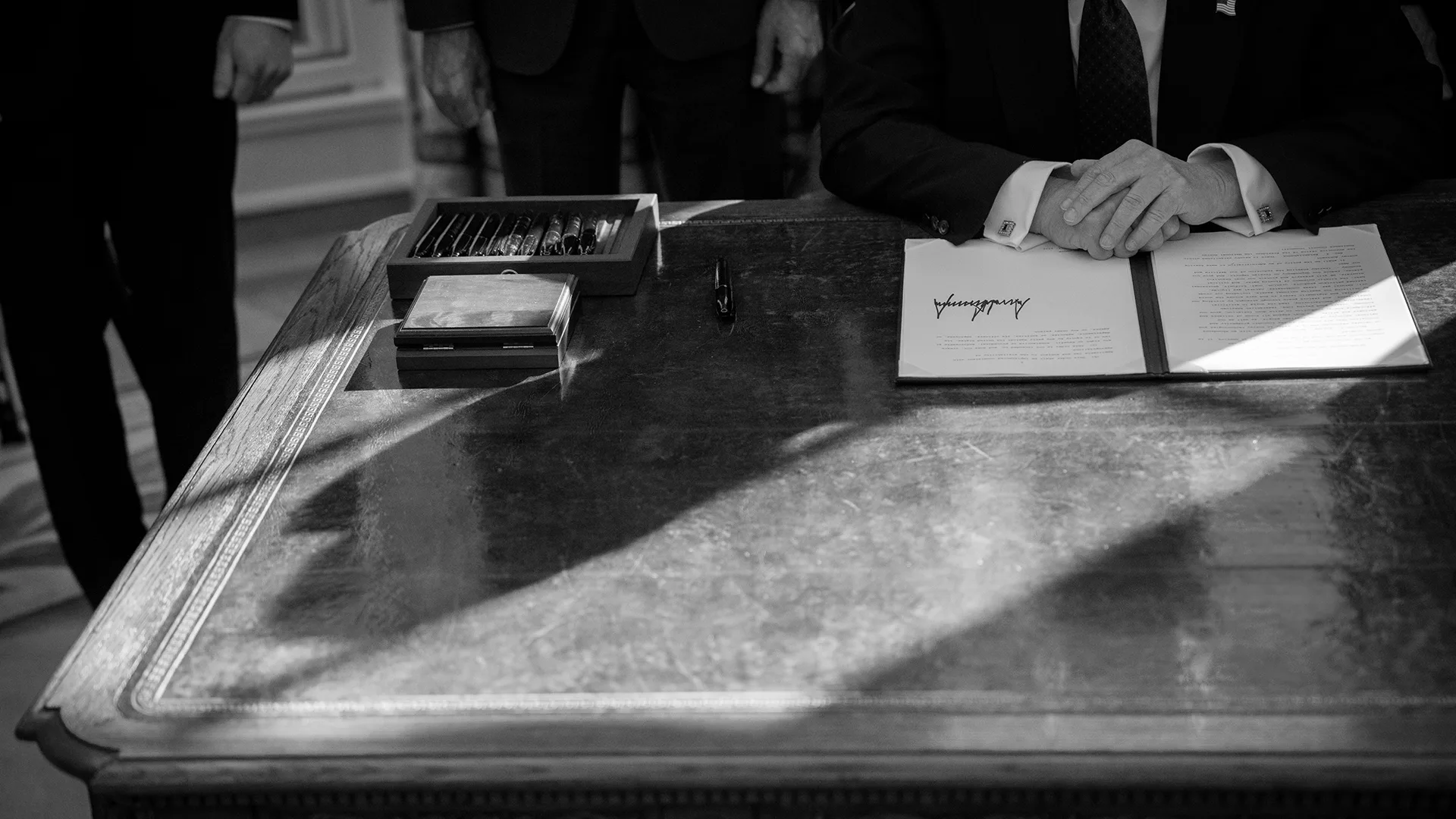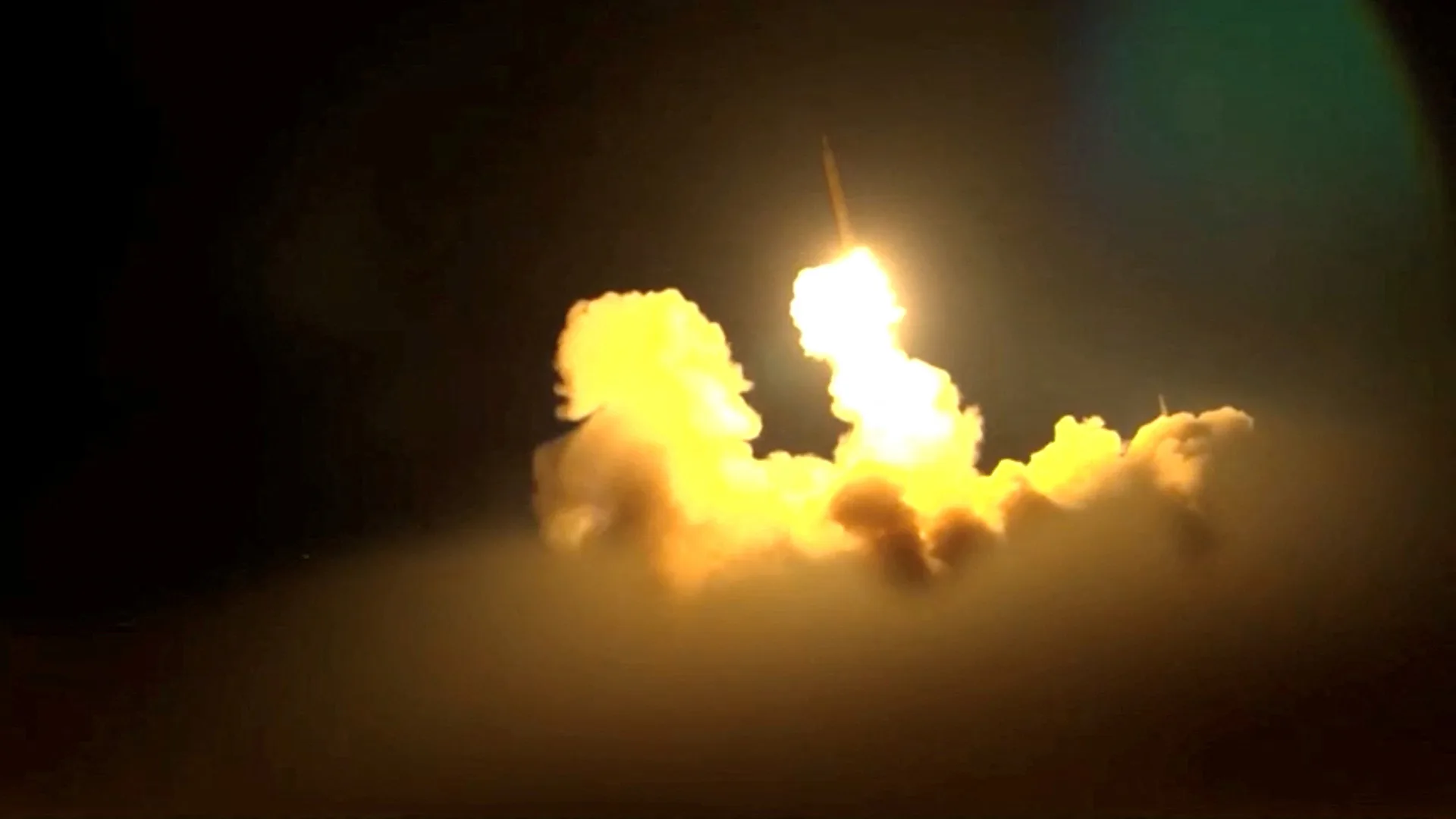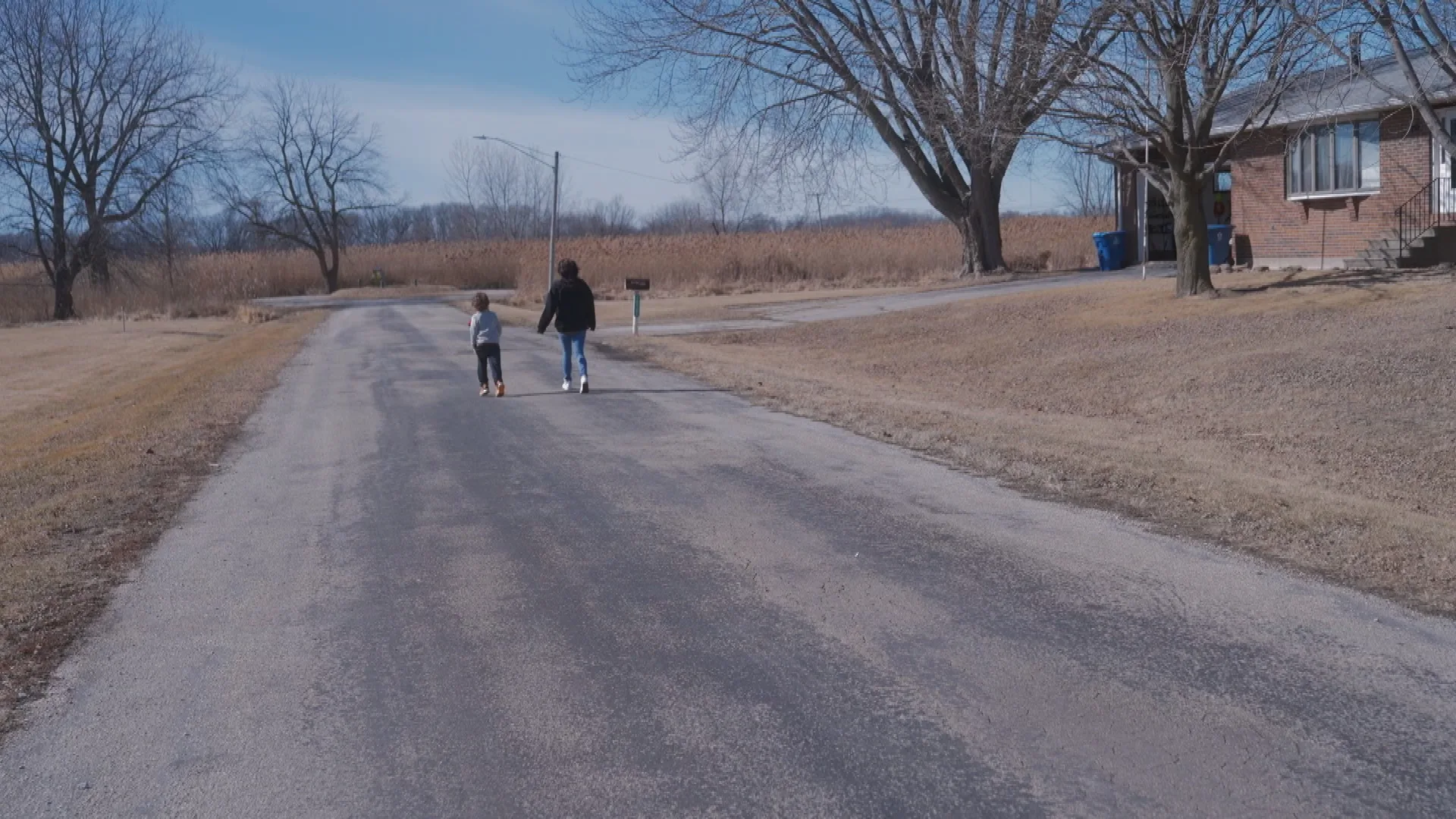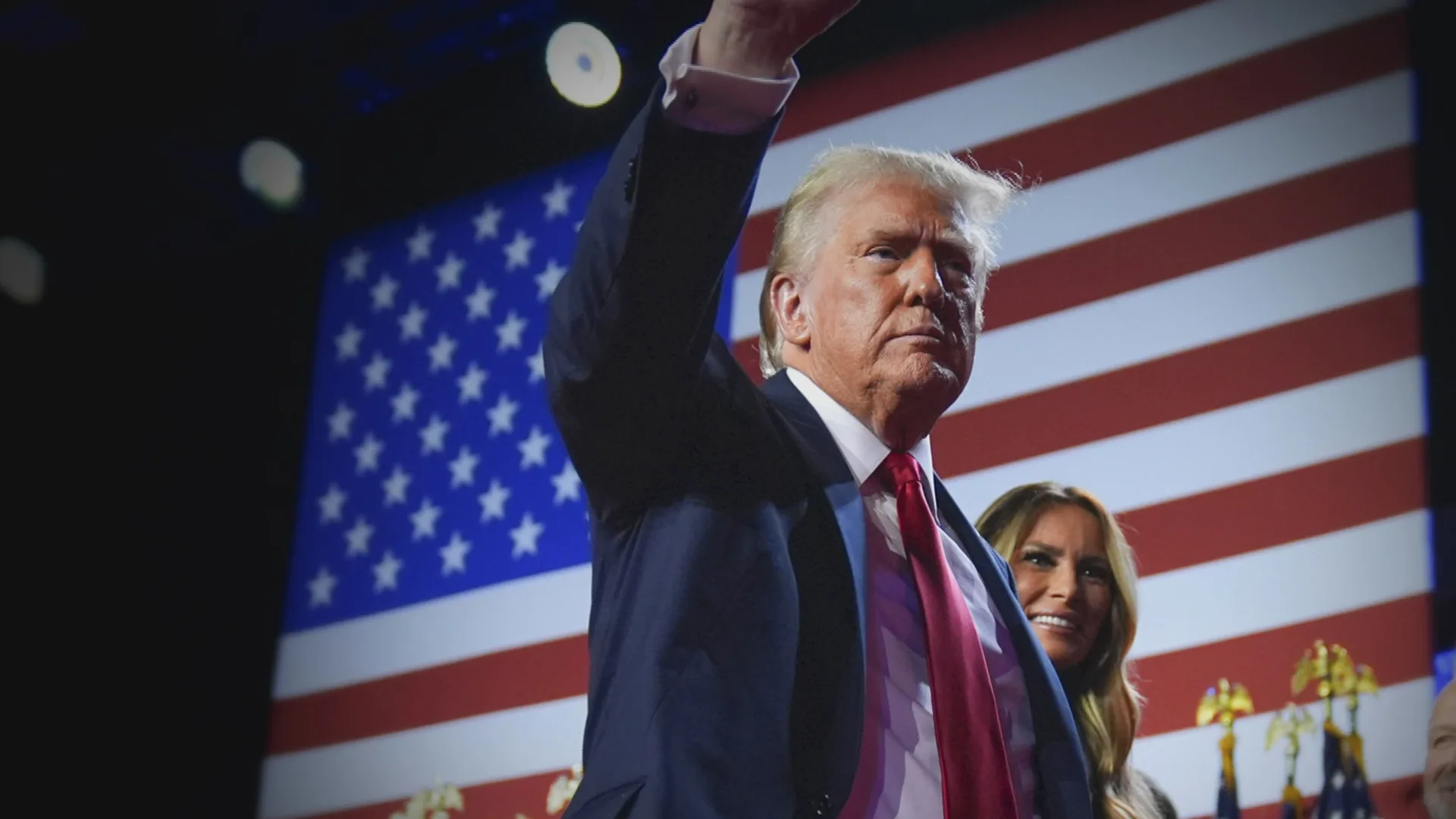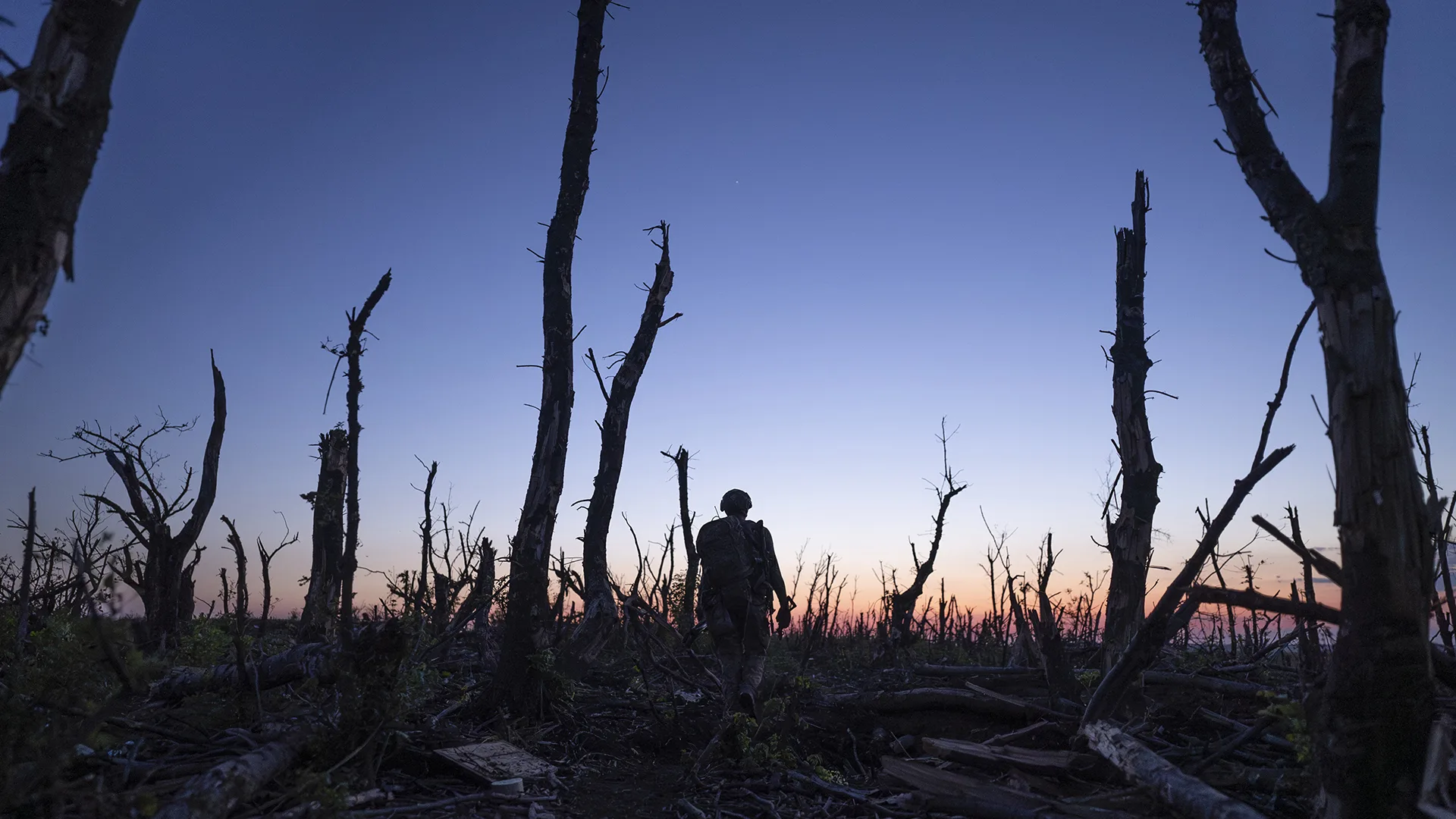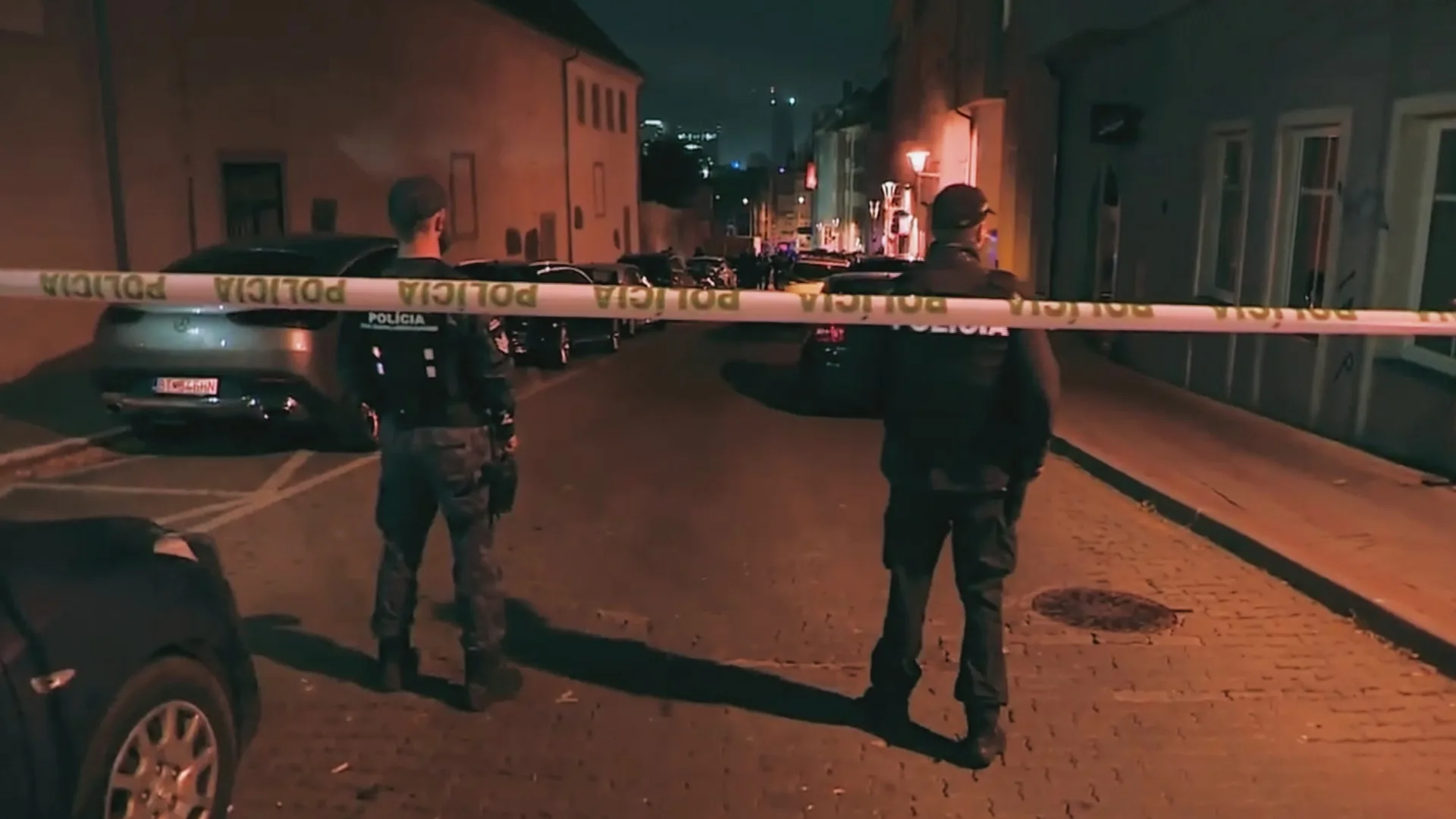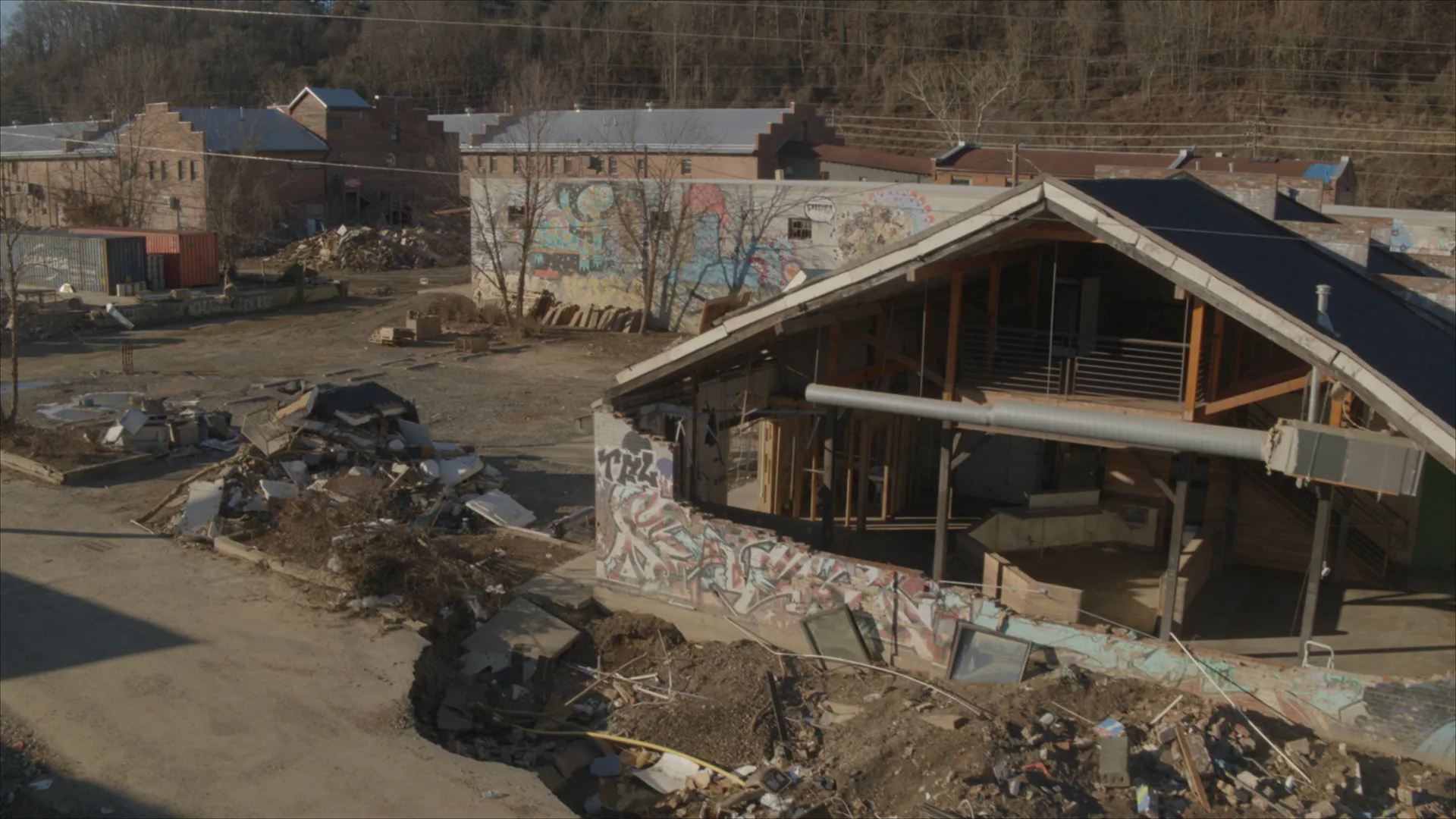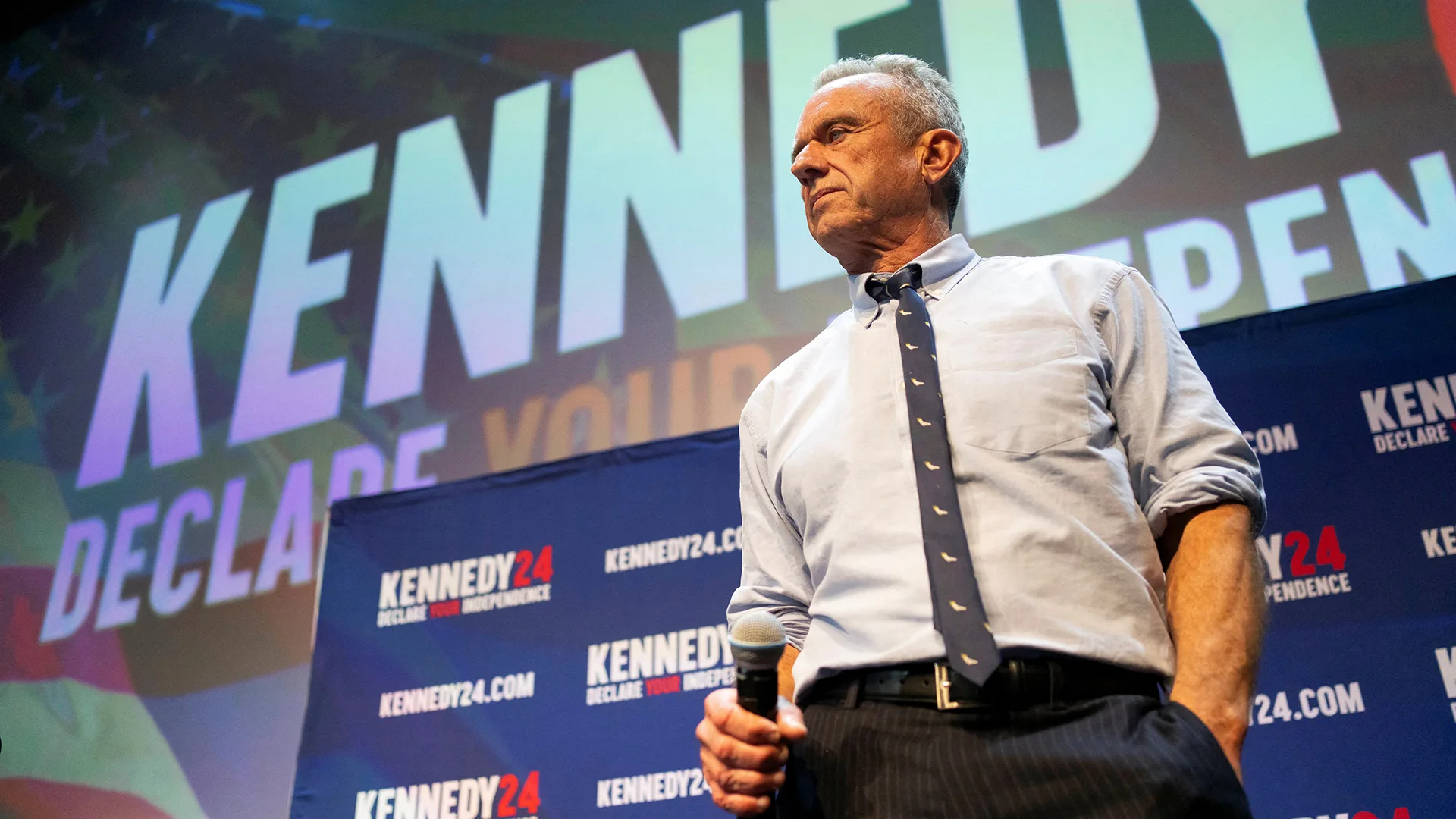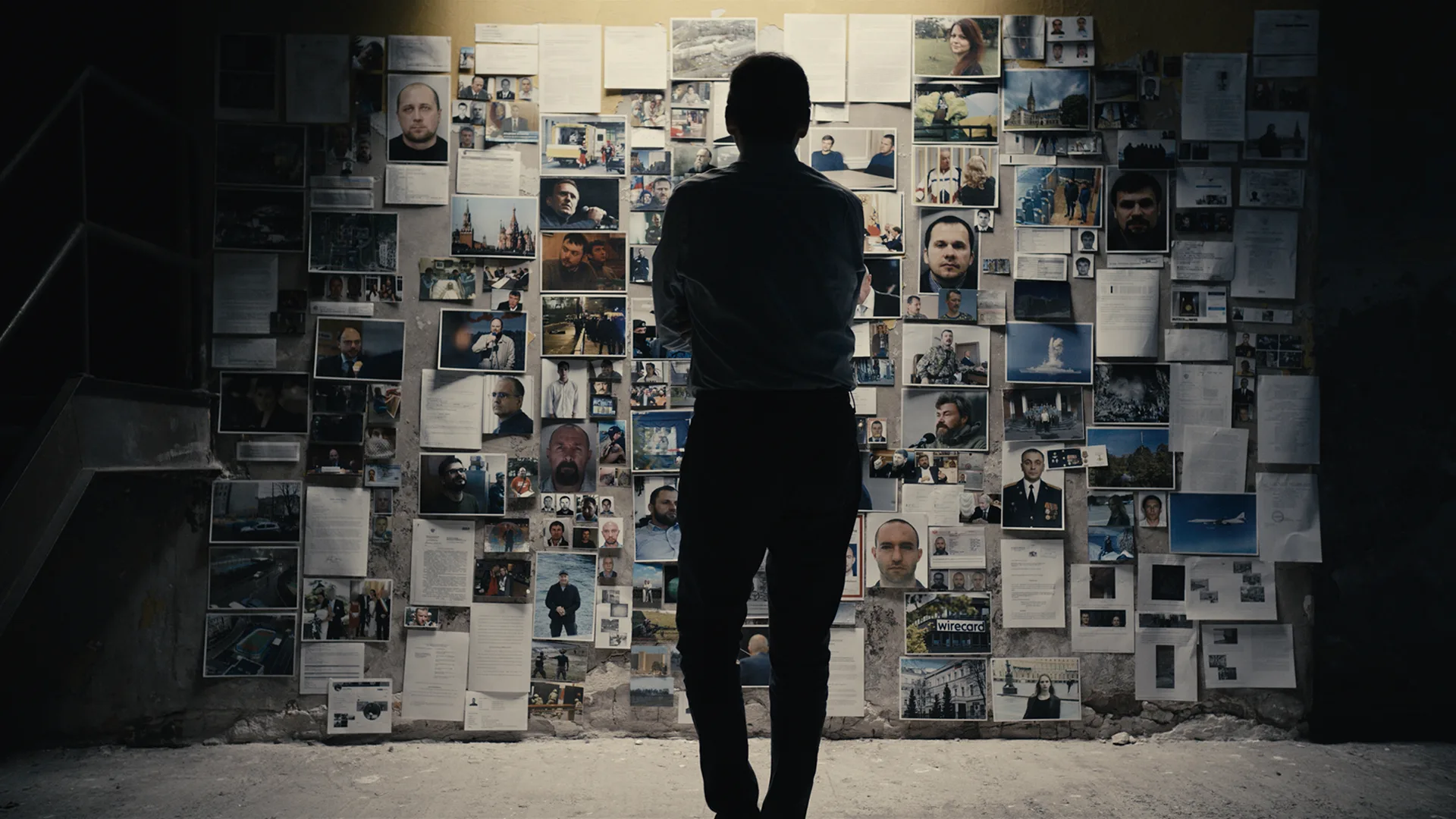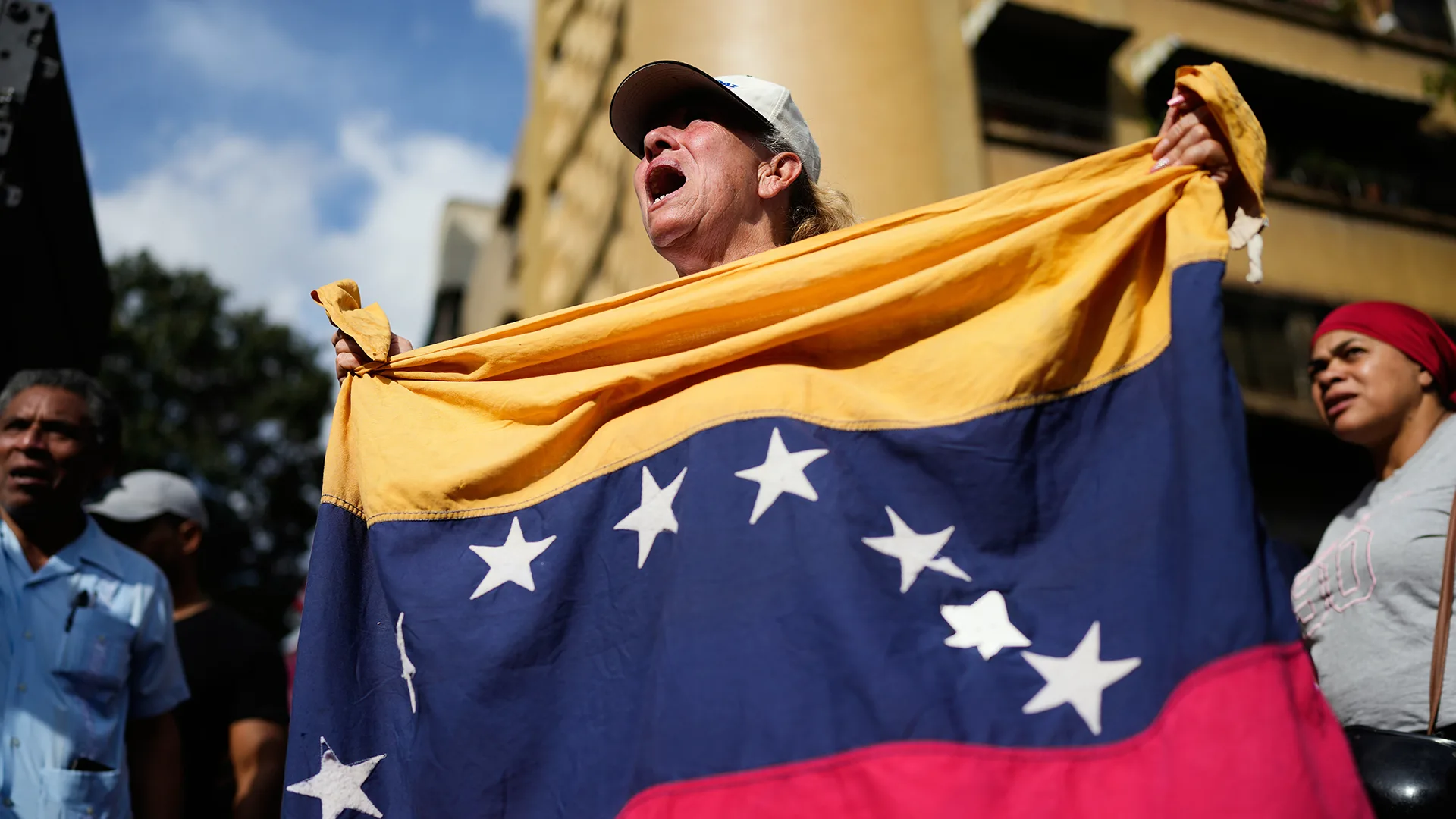Drug War in Ecuador
November 11, 2025
54m
How a once-peaceful nation is now gripped by drug cartels, violence and a military crackdown
Drug War in Ecuador
November 11, 2025
54m
Share
FRONTLINE examines how a once-peaceful nation is now gripped by drug cartels, violence and a military crackdown. With rare access to gang recruits, police, politicians and families caught in the crossfire, the documentary explores efforts to stem the violence and the human toll.
Directed by
Transcript
Credits
Journalistic Standards
Support provided by:
Learn More
Most Watched
The FRONTLINE Newsletter
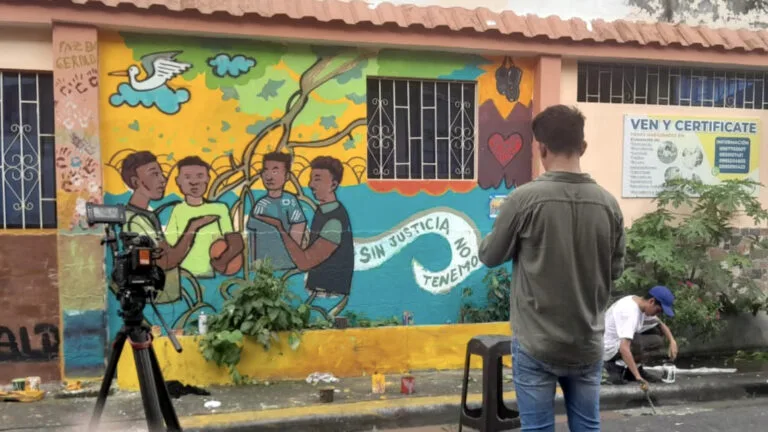
Ecuador in Transition: Marcel Mettelsiefen on Documenting a Nation in Crisis
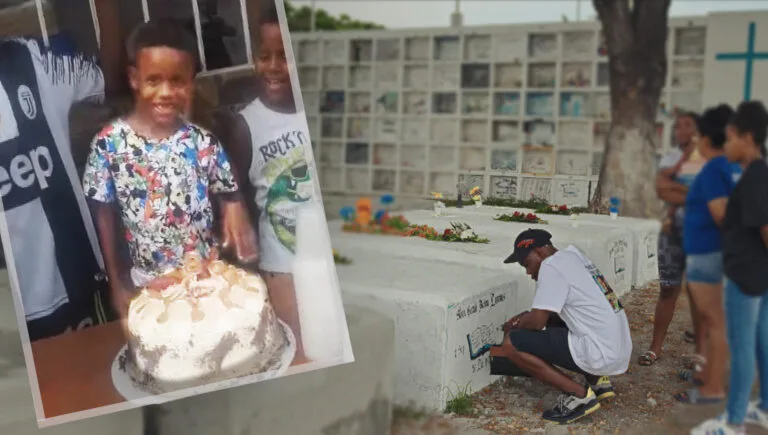
Ecuador’s Military Detained an 11-Year-Old Boy. Then He Was Found Dead.
Related Stories

Ecuador’s Military Detained an 11-Year-Old Boy. Then He Was Found Dead.

Ecuador in Transition: Marcel Mettelsiefen on Documenting a Nation in Crisis
Related Stories

Ecuador’s Military Detained an 11-Year-Old Boy. Then He Was Found Dead.

Ecuador in Transition: Marcel Mettelsiefen on Documenting a Nation in Crisis
Esmeraldas
Northern Ecuador
FATHER JOSE ANTONIO MAESO, Gang violence mediator:
[Speaking Spanish] God be with you. I’m so sorry for your loss.
MRS. PILAR:
[Speaking Spanish] Let’s go.
JOSE ANTONIO MAESO:
[Speaking Spanish] Let’s go.
JOSE ANTONIO MAESO:
[Speaking Spanish] Good.
In the name of the Father, and of the Son and of the Holy Spirit. May the grace, peace and love of the Lord be with us all. In this moment of pain, we prepare to say goodbye. He was taken from us. Today, he rests in the arms of the Lord. And we raise our open arms and cry out for justice. And we pray that he may rest in the house of the Lord.
Let us work for peace, for justice and for reconciliation. We must give meaning to this pain. For, like Christ, he was unjustly killed.
Please take care of yourself. And please, take care of this here.
MRS. PILAR:
[Speaking Spanish] I still have a bullet stuck in this leg.
JOSE ANTONIO MAESO:
[Speaking Spanish] It’s still there?
MRS. PILAR:
[Speaking Spanish] Yes. Ten shots hit my son. He was with his little girl—my granddaughter, she’s around here. My son immediately lifted his daughter to protect her, and then they finished him off.
I ran upstairs thinking, “They’re going to kill me. They’re going to kill me.”
JOSE ANTONIO MAESO:
[Speaking Spanish] We’re living in a violent society. There’s no respect for life anymore. Let’s see if we can get this reported, though not here, for nobody pays attention to this sort of thing here, only internationally.
MRS. PILAR:
[Speaking Spanish] It’s outrageous. It’s so unfair. This shouldn’t happen. It’s so unjust. I just want justice.
Codesa neighborhood
“Tigers” gang stronghold
FEMALE VOICE:
[Speaking Spanish] This used to be a peaceful, quiet city, where children played outside. These are kids that we watched growing up. Seeing them die so cruelly, their heads cut off just like that, it’s something deeply painful, so very sad.
JOSE ANTONIO MAESO:
[Speaking Spanish] We’re going to say goodbye to him and ask God to protect him, and to keep protecting our faith.
FEMALE VOICE:
[Speaking Spanish] Every day I see that kids are easy prey for falling into delinquency. They’re dazzled by that way of life. And then they fall into it and make themselves easy prey.
MALE GANG MEMBER:
[Speaking Spanish] They’re killing in the worst ways imaginable. They’re torturing them to death. They hack you to pieces, they skin you alive. It’s completely insane.
JOSE ANTONIO MAESO:
[Speaking Spanish] Our Father who art in heaven, hallowed be thy name.
MALE GANG MEMBER:
[Speaking Spanish] It’s the law of the jungle. The strongest survive and the weakest die.
MALE GANG MEMBERS [in unison]:
[Speaking Spanish] Hey, friend, we’re active. We, the Tigers, kill the enemy without mercy. Hey, don’t think the clown is your friend just because he’s laughing.
MALE GANG MEMBER:
[Speaking Spanish] That’s what it’s all about—who is stronger, who has more power. Who kills the most, who keeps his word. It all comes from what we learned watching those cartel series. That’s where it comes from. We learned it from TV.
They share videos of violence, of killings. Videos of people being beheaded. They cut off heads, rip out hearts, cut you open like a pig. I don’t know if you’ve ever seen how they open a pig. They cut it open and take out its heart. They show it to you in the video. They tell you, “Look, it’s still beating,” and laugh. [Laughs]
JOSE ANTONIO MAESO:
[Speaking Spanish] Good day.
CONGREGATION:
[Speaking Spanish] Good day.
JOSE ANTONIO MAESO:
[Speaking Spanish] Good day. We are going to ask the Lord to help everyone. And we will entrust all the victims of violence to him. Since I came back here, about 11 people have been killed. Just so you know. Eleven people in only three days.
How beautiful the birds are. I’m going to allow myself to be romantic. Ecuador used to be a very beautiful place. It was a wonderful place to live. It was a paradise. But it has been invaded, so to speak, by evil, by darkness. The light has stopped shining and now we are in black and white.
I believe evil is the absence of good. What is darkness? The absence of light. You can create light. You can’t create darkness. I think it’s an absence. Evil is an absence of good.
What a shame for our beautiful city. With so much violence it has turned red.
COL. JAVIER BUITRÓN, Governor, Esmeraldas:
[Speaking Spanish] Be strong, be strong.
Since 2019, criminal violence in Ecuador has been gradually increasing due to various factors and circumstances. Mainly because it’s near the border with our neighbor Colombia. To the south, there’s Peru. And that’s a key factor in Ecuador becoming a transit country for drugs.
These kinds of problems have caused us Ecuadorians great hardship. There are deaths behind the drug trade, frequent killings because of it. There are problems, there’s extortion. It affected not only Ecuador but also Esmeraldas, which became one of the most violent provinces in the world. This weakened us. It weakened us as a state. However, we are now taking action. We have seriously hurt the criminal organizations. The criminal organizations wanted to rule the country. We had to make decisions, crucial decisions for the well-being of all Ecuadorians.
In 2024, the president of Ecuador declared a state of emergency and deployed the military to the streets.
Col. Buitrón, a former police chief, was appointed governor of Esmeraldas, an epicenter of the violence.
DANIEL NOBOA, President of Ecuador:
[Speaking Spanish] Last year we declared war on all the mafias that sought to claim this country as their own. This is not a fight against common crime, it is a direct confrontation with organized criminal structures with networks that operate inside and outside the country.
JAVIER BUITRÓN:
[Speaking Spanish] Good morning, colleagues, how are you doing?
MALE POLICE OFFICER:
[Speaking Spanish] When I give you the signal, right here is a wall. Stand in front of it.
JAVIER BUITRÓN:
[Speaking Spanish] We are meeting here with the National Police. We’re going to work together, and this is how we are making police operations more efficient and effective.
The state of emergency allows us to enter, track, pursue and search inside homes without waiting for a warrant. We’re battling against them with all our might. We’re defeating them. We’re flushing criminals out of hiding. We’re forcing our way into criminals’ homes.
They’re “Tiger” gang tattoos. Detained three times, he’s under investigation for murder and drugs.
Take a photo.
MALE POLICE OFFICER:
[Speaking Spanish] Why did you erase the messages? Why? What are you afraid of?
Father Jose Antonio Maeso has gained national recognition for mediating between the gangs.
He’s also collecting evidence of alleged abuses by the military and police.
JOSE ANTONIO MAESO:
[Speaking Spanish] What happened? Tell me. Did they find weapons?
FEMALE SPEAKER 1:
[Speaking Spanish] No, that was years ago. Let’s see, let’s see.
FEMALE SPEAKER 2:
Let’s go inside, let’s go inside. Although inside there’s still a lot of tear gas.
JOSE ANTONIO MAESO:
[Speaking Spanish] They used tear gas against you?
FEMALE SPEAKER 2:
[Speaking Spanish] Inside, there’s too much tear gas. Let’s stay here.
JOSE ANTONIO MAESO:
[Speaking Spanish] Let’s see, tell me a little bit. They started off firing tear gas?
FEMALE SPEAKER 1:
[Speaking Spanish] With gas, with everything, everything.
FEMALE SPEAKER 3:
[Speaking Spanish] They don’t care if there are children, they use tear gas.
JOSE ANTONIO MAESO:
[Speaking Spanish] Were there children in the house?
FEMALE SPEAKER 1:
[Speaking Spanish] Yes, my niece was there.
JOSE ANTONIO MAESO:
[Speaking Spanish] They can’t threaten civilians. You’re civilians. They’re an army. They have to defend you, not attack you.
What did they hit you with, their batons?
MALE SPEAKER:
[Speaking Spanish] A piece of cable and a plank of wood.
JOSE ANTONIO MAESO:
[Speaking Spanish] I’m sorry. They came in without a warrant. There’s no justification for that. Please be very careful, everyone. A lot of people have gone missing. And no one has the right to take anyone else’s life. And if you give us permission, we will file a report internationally. It’s no use doing it here. And take good care of yourselves.
It used to be just the gangs that put dead people on the streets. But now it’s also the police and military who are putting dead people on the streets and making people disappear.
The state carries out illegal interventions, abusing its power against men, women, children, the sick, against everyone. Where have we ended up? Is that what we want on the streets? Silence makes you an accomplice. That is why we have the responsibility, and I would say, obligation, to be the spokesperson, the witness, the voice of those who have no voice, to reach where others do not reach. Because if we don’t, we become accomplices.
MALE VOICE:
[Speaking Spanish] Well, thanks for coming. Thank you for being here, especially our dear friend visiting from Esmeraldas.
JOSE ANTONIO MAESO:
[Speaking Spanish] Thank you very much. Good afternoon, everyone. I feel very emotional being with you. This is the fourth memorial service we’ve held for the four murdered children. For us they are an icon of struggle, resistance and resilience.
The four from Guayaquil have become a symbol. They were the first proof, clear proof that there were forced disappearances in Ecuador.
Guayaquil
Southwest Ecuador
RONNY MEDINA, Steven’s father:
[Speaking Spanish] Son, I miss you so much, I miss you so much. I still can’t believe it, Son. If you knew how much I miss you. I miss you so much. I wish this were a dream.
Well, my son’s name was Steven Gerald Medina Lajones. He was a very cheerful, hyperactive boy. He could also be strong-willed and a bit wild. But he loved other kids and he liked to help my mother, his grandmother, with things around the house. What he loved most was Spider-Man. We bought him Spider-Man shoes, the T-shirt. He loved anything with Spider-Man on it.
Dec. 8 was the last day I saw my son. I arrived home between 7 and 8 that night and he wasn’t there.
GINO, Steven’s cousin:
[Speaking Spanish] We went to play ball at 6. And we finished at 8. And when we finished playing, we went to buy some bread. We hung around buying the bread. And then we sat down to eat it. Then the military came. They surrounded us and started insulting us. So we ran. And Gerald [Steven] was behind me, right next to me. Then I started running faster. And when I looked back, I saw he wasn’t behind me anymore. [Cries]
RONNY MEDINA:
[Speaking Spanish] That’s when they caught them. My son is the one here in the truck. The one in the blue T-shirt. That’s my son there.
I really wish I’d been there at that moment. I’m telling you, at that moment, those men would’ve had to kill me. I felt guilty because I wasn’t there with him at this moment.
FEMALE NEWSREADER:
[Speaking Spanish] On Tuesday, police found several unidentified charred bodies in a remote area of Taura in the province of Guayas.
FEMALE NEWSREADER:
[Speaking Spanish] The state prosecutor has just confirmed that the bodies are those of the four missing children.
FEMALE NEWSREADER:
The public prosecutor’s office requested 16 soldiers to be put on military detention.
The military said the soldiers released the boys alive and that gang members later killed them.
SILVANA LAJONES, Steven’s mother:
[Speaking Spanish] On the 31st, they confirmed that the body was my son. I didn’t know what to do. I felt like I was losing my mind. I screamed and I started running. I took my daughter, Ruth, and started to cry with her. [Cries] Then they said I had to identify the corpse, but I didn’t want to go in. I didn’t want to go in. They said, “Go in, because you know your son best.”
Now I wake up seeing that body, the body I saw, the one they handed over to me.
STEVEN’S GRANDMOTHER:
[Speaking Spanish] And now what else are you going to put in it? We’re putting in some spices to give it good color.
RUTH, Steven’s sister:
[Speaking Spanish] What was he like? We used to play. We played ball. We played all kinds of games.
FEMALE VOICE:
[Speaking Spanish] Happy birthday. May God protect you. [Laughter]
MALE INTERVIEWER [off-screen]:
[Speaking Spanish] Are you afraid?
RUTH:
[Speaking Spanish] Yes.
MALE INTERVIEWER [off-screen]:
[Speaking Spanish] What are you afraid of?
Children’s Support Center
Guayaquil
SISTER SUSANA DEL PILAR VELOZ GÁLVEZ:
[Speaking Spanish] We’ve been living through very sad times, haven’t we?
YOUNG CHILD:
[Speaking Spanish] Yes.
SUSANA DEL PILAR VELOZ GÁLVEZ:
[Speaking Spanish] We’ve lost many people, haven’t we?
CHILDREN:
[Speaking Spanish] Yes.
SUSANA DEL PILAR VELOZ GÁLVEZ:
[Speaking Spanish] Many people. Many people, that’s right. What do we have to do?
CHILDREN:
[Speaking Spanish] Remember them.
SUSANA DEL PILAR VELOZ GÁLVEZ:
[Speaking Spanish] I can think of something. We could make a painting on the wall, something very big. With their faces on it. A mural. A big mural.
Unfortunately, today there is a context of inequality. Social, economic and political. An inequality where social classes are deeply divided. Class differences here are very obvious. The poor are really, really poor, and the rich are really, really rich.
The state doesn’t exist here. Real change won’t happen unless the state restructures itself completely. If it doesn’t, we won’t be able to get out of this situation.
If it weren’t for the Catholic Church, there would be nothing.
JOSE ANTONIO MAESO:
[Speaking Spanish] I think that when you want to solve a conflict, it’s like a big jigsaw puzzle, where all the pieces have to fit together. If you leave some pieces out, the conflict will continue. And that’s why we believe that we have to have a dialogue with all parties involved. And all those involved means also including the gangs and criminal groups.
Cuatro Esquinas
Esmeraldas
Cuatro Esquinas is a violent neighborhood where Father Maeso once brokered a gang truce and set up projects for the community.
JOSE ANTONIO MAESO:
[Speaking Spanish] Before the military occupation, how many months had we been working? August, September, October. About six months when there were no murders.
MALE GANG MEMBER:
[Speaking Spanish] No beheadings.
JOSE ANTONIO MAESO:
[Speaking Spanish] No beheadings. Nothing, right?
And that was an agreement between you and us, and then came the military occupation, when we had to stop everything because of the police crackdown. What should we do now?
MALE GANG MEMBER:
[Speaking Spanish] Let’s start again with the projects, because they were good for us and for society.
And even if it’s only a small thing, it gives us a purpose.
We want jobs to keep ourselves busy, so we don’t have to hang around on corners anymore and we stop thinking about going downtown to steal stuff and we stop doing bad things to people.
JOSE ANTONIO MAESO:
[Speaking Spanish] I believe that violence goes round and round in a diabolical circle. And this diabolical circle is like a diabolo—not of the devil, but the diabolo (toy) that spins around on its own axis. And there are generations of impoverished and violent people who are still impoverished and violent.
MAN ON STREET:
[Speaking Spanish] We’re easy to manipulate. We have no other way to survive. We have to kill to be able to live. We have to sell drugs to be able to live, so we can eat, so we can support our families.
JOSE ANTONIO MAESO:
[Speaking Spanish] If the problem is that they have no means to survive, then let’s create small spaces where they can develop and find new opportunities in life so that crime is not their only option.
The agreement was the hairdressing kit. Here is the hairdressing kit. Wait, one by one …
The truth is … No, no. This is the … This is the tattoo machine.
If I give you money, people will say I’m financing narcos and mafias and any organization would cut my head off. They would say it was embezzlement and throw me in jail. But if I buy three or four hair clippers, no one says a thing.
MALE GANG MEMBER:
[Speaking Spanish] The priest comes to support the neighborhood, the people, to change the lives of some of us who are lost.
President Noboa has said his administration is on the side of justice and abuses will be prosecuted.
He and the gang crackdown remain popular with many.
JAVIER BUITRÓN:
[Speaking Spanish] Mr. President, good morning. Mr. President, good morning. Welcome. Welcome to the land that loves you. Thank you for coming here again. Mr. President. A pleasure to greet you, as always.
Mr. President, this lady would like a photo.
WOMAN AT NOBOA RALLY:
[Speaking Spanish] For us, the people of Esmeraldas, life used to be unsafe until a president like Daniel Noboa came along and appointed Col. Buitrón as governor. And today we have made the streets of our city safe again. Long live the president.
MALE ANNOUNCER:
[Speaking Spanish] President of the republic, Daniel Noboa.
DANIEL NOBOA:
[Speaking Spanish] We are in the final stretch of this fight, this fight for justice, for dignity, for the future of Ecuadorians who want the option of a better country.
A country where all the criminals, scoundrels, hitmen and gangsters, all of them are in the worst prisons where they don’t have the same rights as normal people. [Ecuadorans] don’t want a country submerged in narco-politics, delinquency and criminality. We are the ones who lock criminals up and give our young people opportunities. Thank you!
MALE ANNOUNCER:
[Speaking Spanish] Noboa for president!
CROWD [chanting in Spanish]:
Noboa for president!
Ronny and Silvana are working with a lawyer to make sure the soldiers are held accountable for their role in Steven’s death.
FERNANDO BASTIAS, Lawyer:
[Speaking Spanish] Hello, hello, how are you?
RONNY MEDINA:
[Speaking Spanish] Blessings, man.
FERNANDO BASTIAS:
[Speaking Spanish] Good morning, good morning.
RONNY MEDINA:
[Speaking Spanish] Here we are again.
FERNANDO BASTIAS:
[Speaking Spanish] This is basically to talk about what happened, or rather what didn’t happen on Sunday. In theory, the reconstruction of the crime was supposed to take place that day. But the reconstruction was suspended.
RONNY MEDINA:
[Speaking Spanish] It’s the second time this has happened, and it’s always right before the reconstruction is about to start.
FERNANDO BASTIAS:
[Speaking Spanish] Yes, in this case, a mistake was made by the secretary of the prosecutor’s office. They say they had notified us five days beforehand, but the message never reached our inbox.
RONNY MEDINA:
[Speaking Spanish] I feel very afraid. Afraid of how these people might hurt us and of who we’re up against. No matter what, our fight is against the state, and you know that fighting the state is madness. Yes, I am afraid. Afraid they might retaliate against me or my family.
I just want justice to be done. I don’t want these bad people to go free after what they did, because it wouldn’t be fair. It wouldn’t be fair, right?
JOSE ANTONIO MAESO:
[Speaking Spanish] One, two and three. OK.
The situation in our prisons is really inhumane. They are suffering physical and psychological torture. Many have died of starvation or are abandoned to their fate with tuberculosis. Tortured, mistreated.
Two, three. Take it down.
Food drop-off
Esmeraldas Prison
As part of the crackdown, Ecuador’s military was put in control of the prisons, which had become hotbeds of gang violence.
JOSE ANTONIO MAESO:
[Speaking Spanish] Let’s see, let’s see.
WIFE OF PRISONER:
[Speaking Spanish] Look, they’re doing it. When they wave the clothes they’re asking for help. It looks like they’re about to get beaten up.
They’re beating them, beating them up. They’re hurting them. For the last three days they’ve been beating those boys up. We’ve recorded it on our phones. They’re asking for help.
In wing C, they beat them until they got too tired to go on. They kicked them. They whipped them with hoses. They beat them with clubs.
JOSE ANTONIO MAESO:
[Speaking Spanish] Calm down, please calm down
MOTHER OF PRISONER:
[Speaking Spanish] I can’t be calm. I can’t take it anymore. My son is wounded, my little boy. God only knows how he is doing.
JOSE ANTONIO MAESO:
[Speaking Spanish] Why is he wounded? How did he get hurt?
MOTHER OF PRISONER:
[Speaking Spanish] He got shot. It was the soldiers who shot him.
JOSE ANTONIO MAESO:
[Speaking Spanish] You women have to organize yourselves. We are reaching out to the international press, international organizations. We’ll keep speaking out and denouncing this but we have to be strong. If you fall apart, your families fall apart. We have to be strong. Remember that we’re here and you’re not alone.
Prosecutors are having the soldiers reconstruct the night they picked Steven up.
RONNY MEDINA:
[Speaking Spanish] It is the first time I’m going to see their faces. They are going to reenact everything that happened that day when they caught him, took him away and beat him, the whole process. Everything that happened that evening, they have to repeat it step by step.
Honestly, when I see them, I don’t know how I’ll react.
MALE POLICE OFFICER:
[Speaking Spanish] This is a reconstruction. This is a technical process. The prosecutor’s office authorizes the forensics department to re-create all the events that have been established to better clarify how it happened.
RONNY MEDINA:
[Speaking Spanish] And can we record it?
MALE POLICE OFFICER:
[Speaking Spanish] No. You can’t record anything.
RONNY MEDINA:
[Speaking Spanish] Of course, I felt the impulse to take revenge, to take things into my own hands. But I can’t, because if I do that it would put my family at risk. I feel anger, rage, against those men.
We will fight to the end, no matter what. We are going to keep on fighting so they don’t go unpunished.
You’re going to have to read because I am bad at reading.
SILVANA LAJONES:
[Speaking Spanish] What do you mean, you’re bad at reading?
RONNY MEDINA:
[Speaking Spanish] Yeah, I don’t read well.
SILVANA LAJONES:
[Speaking Spanish] Give it a go. It’s upside down.
RONNY MEDINA:
[Speaking Spanish] OK, read this bit.
SILVANA LAJONES:
[Speaking Spanish] You start off saying, “In the name of the Father, the Son …”
RONNY MEDINA:
[Speaking Spanish] For me there is no justice here on earth. I don’t believe in justice on this earth. I only believe in the justice of God. I know that God takes time but he never forgets. And justice does come eventually, but not here. Here on earth there is no justice. It doesn’t exist.
SILVANA LAJONES:
[Speaking Spanish] “The Lord is close to those whose hearts are broken and saves those whose spirits are crushed.”
FEMALE TRADITIONAL HEALER:
[Speaking Spanish] We are living through the end of days. All we can do is ask the Creator to bring change soon, because we are living through the final reckoning.
Stand straight.
FEMALE PREACHER:
[Speaking Spanish] Holy are you, beloved Lord, my God. You are the one who guards every family on this day. Lord of the young people, Father, we ask you to draw closer to young people, to those young people who have evil in their hearts, let them not commit that evil. Give them the opportunity to know you, Father. In the name of Jesus the merciful one. Look how many young people have died, Lord. Lord, embrace those who are suffering. Those children who were left without parents, Lord. And those parents who lost their children.
FEMALE TRADITIONAL HEALER:
[Speaking Spanish] Your children are angels, my dear. They are martyrs. They came into this world, but not to spend too much time. Don’t cry for him. Because he is better off there than here.
RONNY MEDINA:
[Speaking Spanish] Look, if I collapse, if I fall apart, then my kids will, too. And I can’t show my kids that I’m suffering, that I’m defeated, because it’s their brother. It’s their brother and I know that they are suffering, too.
MALE SOLDIER:
[Speaking Spanish] Two, three. Attention!
JAVIER BUITRÓN:
[Speaking Spanish] Wearing the uniform that you wear is an honor, and you have to defend it even with your own life. Today, Esmeraldas has changed. It has been transformed by the work and sacrifices made by each one of you, from the lowest soldier to the highest commander, and in that order. I want to congratulate you. May God watch over you. May God bless you and give you the strength you need to continue defending the beautiful yellow, blue and red. God bless you all.
I have been a police commander for 33 years. But I also know the sacrifice that you all make every day. Sacrifice is not easy. Sometimes you take on the hardest tasks. And sometimes, this work is the least recognized. Thank you for your work, comrades. May God bless you. Keep drawing on the strength that you have.
MALE SOLDIER:
[Speaking Spanish] Thank you.
JAVIER BUITRÓN:
[Speaking Spanish] It’s hard work, every day. It’s demanding and intense, every day. But this is how we are bringing peace back to Ecuadorians.
Sir, how are you? I’m Col. Buitrón. How are you all?
Human rights activists are not on the ground. They’re often sitting at a desk. Human rights activists usually focus on protecting criminals. In 99% of cases, human rights often end up excusing criminals, and we cannot allow that to continue. We are an independent and sovereign country, and here, the will of the great majority of Ecuadorians prevails. What we want and hope for is the long-awaited peace.
FEMALE GPS VOICE:
[Speaking Spanish] Continue in the direction of Avenue America.
FEMALE SEMINAR HOST:
[Speaking Spanish] Welcome to the International Seminar on the Prevention of Forced Recruitment of Girls, Boys and Adolescents.
JOSE ANTONIO MAESO:
[Speaking Spanish] Thank you very much, everyone who is here listening. It is an honor for me to be here.
We have run out of young people in our neighborhoods because they are being killed by organized crime groups and the military in very complicated neighborhoods.
Do you believe in elves? Yes or no? [Laughter] Do you believe in elves? Yes, because you believe all the lies that television tells us. We believe it when they tell us everything is fine because we don’t have information about those who have died. Since Monday I’ve heard of at least four murders in Esmeraldas alone. Policemen, young adults and teenagers, and not a single one was reported in the media.
We are fighting fire not with fire, but with gasoline. This is the result of structural violence that has been growing for years. It’s not intentional anymore, it’s become normal, and it affects specific groups,
especially Afro-descendants and the poor. They have always suffered from structural violence. They have always been its victims. And now, as the only way out of where they are, they have found, in violence, their only means of survival. The victims of structural violence have become perpetrators themselves.
FEMALE SEMINAR HOST:
[Speaking Spanish] Thank you very much. Truly, how valuable it is to have you here.
JOSE ANTONIO MAESO:
[Speaking Spanish] There is so much structural violence that it has become very complicated. Why continue to denounce it? Obviously we have to keep denouncing it. Not to change the world, but so we don’t lose our critical spirit. So we don’t become part of the problem in this web of corruption, but at least try to be part of the solution.
The beach is not a solid mass, but countless grains of sand. And when a single grain moves and gets into your eye, it stings. If it gets in your clothes, it bothers you. If it gets under your foot, it bothers you when you walk. We have to be that grain of sand that gets in your eye, that makes you cry, that irritates you until you say, “Stop, enough!” And we have to seek justice that is truly just.
Defend me from the military, from the hitman, evil, danger and death. Amen.
MALE MURAL ARTIST:
[Speaking Spanish] Yes, let me draw the outline there so you can see it. Correct, from there. And here, too. We are almost finished.
RONNY MEDINA:
[Speaking Spanish] Honestly, thank you so much. It’s beautiful.
Honestly, I keep fighting because there are so many children on the streets around here. There are so many neighborhoods, and I keep fighting because I don’t want other families to go through what we’ve lived. If we don’t do something, it will continue to happen with many more children.
“Without justice, there is no peace.”
In 2025, violent crime surged to unprecedented levels in Ecuador.
Col. Javier Buitrón is no longer governor of Esmeraldas.
Father Jose Antonio Maeso continues his work in prisons and gang neighborhoods.
The soldiers who picked up Steven and the other boys are currently on trial for their role in the deaths.
DIRECTED BY Marcel Mettelsiefen
PRODUCED BY Stephen Ellis Marcel Mettelsiefen Mayte Carrasco Ahisha Ghafoor
SENIOR PRODUCER Eamonn Matthews
EDITED BY Stephen Ellis ACE
ASSOCIATE PRODUCER Esme Ramlal
DIRECTOR OF PHOTOGRAPHY Marcel Mettelsiefen AEC
ADDITIONAL CAMERA Thomas O. Pablo Secaira
ORIGINAL MUSIC Ege Ateslioglu
SOUND DESIGN & MIX Jez Spencer
COLOR GRADE Emilio Sacco
ADDITIONAL ONLINE EDITOR/COLORIST Jim Ferguson
ADDITIONAL SOUND MIX Jim Sullivan
FIELD PRODUCERS / LOCAL PRODUCERS Rene Cobos – Ecuador Blanca Montcada – Guayaquil Thalie Ponce – Guayaqil
SOUND / ECUADOR Arturo Moreno Victor Gonzales
LINE. PRODUCER / PRODUCTION MANAGER Juan Carlos Calderón – Ecuador
TRANSLATION & TRANSCRIPTION Eugenia Erazo
ADDITIONAL TRANSLATION Beatriz Oropeza Boris Muniz
ARCHIVE PRODUCER Jack Lee Taylor
ARCHIVAL MATERIAL Courtesy of Ronny Medina AFP
ADDITIONAL MATERIAL Al Jazeera BBC CBS DNews DW Español SBS News TC Televisión
FOR ITV
COMPLIANCE Laura Ware Roisin Gadel
EXECUTIVE PRODUCER Tom Giles
ORIGINAL PRODUCTION FUNDING PROVIDED BY Corporation for Public Broadcasting, Abrams Foundation, John D. and Catherine T. MacArthur Foundation, Park Foundation, Heising-Simons Foundation, FRONTLINE Journalism Fund with major support from Jon and Jo Ann Hagler through the Jon L. Hagler Foundation, additional support from Koo & Patricia Yuen and from the Charina Endowment Fund.
FOR FRONTLINE
POST PRODUCTION MANAGER Tim Meagher
SENIOR EDITOR Barry Clegg
EDITOR Brenna Verre
EDITORS Christine Giordano Joey Mullin
PRODUCTION ASSISTANT Hinako Barnes
ASSISTANT EDITORS Thomas Crosby Julia McCarthy
FOR GBH OUTPOST
SENIOR POST PRODUCTION MANAGER Beth Godlin Lillis
SENIOR DIRECTOR OF PRODUCTION TECHNOLOGY Tim Mangini
INTERNS Tom Brown Nicholas Doyle
SERIES MUSIC Mason Daring Martin Brody
EXECUTIVE ASSISTANT Ellen O’Neill
DIRECTOR OF IMPACT AND EXTERNAL RELATIONS Erika Howard
SENIOR DIGITAL WRITER Patrice Taddonio
PUBLICITY & AUDIENCE ENGAGEMENT COORDINATOR Julia Heffernan
ASSISTANT DIGITAL EDITOR Ambika Kandasamy
ASSOCIATE DIGITAL EDITOR Mackenzie Wright
DIGITAL PRODUCER / EDITOR Tessa Maguire
DIRECTOR OF MARKETING & COMMUNICATIONS Anne Husted Blatt
ARCHIVES & RIGHTS MANAGER John Campopiano
SENIOR BUSINESS ASSOCIATE Sean Gigliotti
FOR GBH LEGAL Eric Brass Suzy Carrington Jay Fialkov
SENIOR CONTRACTS MANAGER Gianna DeGiulio
SENIOR BUSINESS MANAGER Sue Tufts
SENIOR DIRECTOR, BUSINESS & OPERATIONS Mary Sullivan
SENIOR DEVELOPER Anthony DeLorenzo
LEAD, DIGITAL DESIGN & INTERACTIVE Dan Nolan
FRONTLINE/COLUMBIA JOURNALISM SCHOOL FELLOWSHIP TOW JOURNALISM FELLOW Jala Everett
FRONTLINE/NEWMARK JOURNALISM SCHOOL AT CUNY FELLOWSHIP TOW JOURNALISM FELLOW Sunny Nagpaul
FRONTLINE/MISSOURI SCHOOL OF JOURNALISM FELLOWSHIP MURRAY JOURNALISM FELLOW Skye Lucas
PBS CREATIVE VOICES FELLOWSHIP DIGITAL PRODUCER Tasnia Choudhury
ARCHIVAL PRODUCER Coral C. Salomón Bartolomei
SENIOR DIGITAL PRODUCER / EDITOR Miles Alvord
SENIOR DOCUMENTARY EDITOR & PRODUCER Michelle Mizner
DIGITAL EDITOR Priyanka Boghani
STORY EDITOR & COORDINATING PRODUCER Katherine Griwert
POST COORDINATING PRODUCER Robin Parmelee
SENIOR EDITOR AT LARGE Louis Wiley Jr.
FOUNDER David Fanning
SPECIAL COUNSEL Dale Cohen
SENIOR PRODUCERS Dan Edge Frank Koughan
SENIOR EDITOR & DIRECTOR, LOCAL JOURNALISM Erin Texeira
SENIOR EDITOR, INVESTIGATIONS Lauren Ezell Kinlaw
MANAGING DIRECTOR Brian Eule
MANAGING EDITOR Andrew Metz
EXECUTIVE PRODUCER & EDITOR-IN-CHIEF Raney Aronson-Rath
A Duskwater Films production for GBH/FRONTLINE
© 2025 Duskwater Films and WGBH Educational Foundation All Rights Reserved
FRONTLINE is a production of GBH, which is solely responsible for its content.
Explore
Policies
Teacher Center
Funding for FRONTLINE is provided through the support of PBS viewers and by the Corporation for Public Broadcasting, with major support from Ford Foundation. Additional funding is provided the Abrams Foundation, Park Foundation, John D. and Catherine T. MacArthur Foundation, Heising-Simons Foundation, and the FRONTLINE Trust, with major support from Jon and Jo Ann Hagler on behalf of the Jon L. Hagler Foundation, and additional support from Koo and Patricia Yuen. FRONTLINE is a registered trademark of WGBH Educational Foundation. Web Site Copyright ©1995-2025 WGBH Educational Foundation. PBS is a 501(c)(3) not-for-profit organization.
